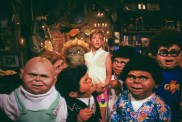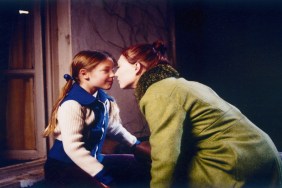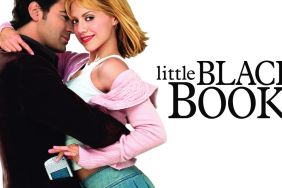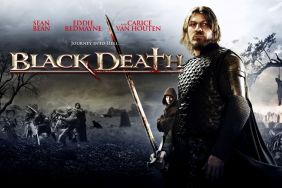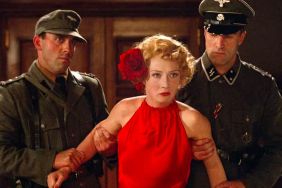Cast:
Carice van Houten as Rachel/Ellis
Sebastian Koch as Ludwig Müntze
Thom Hoffman as Hans Akkermans
Halina Reijn as Ronnie
Waldemar Kobus as Günther Franken
Derek de Lint as Gerben Kuipers
Christian Berkel as General Käutner
Dolf de Vries as Notary Smaal
Peter Blok as Van Gein
Michiel Huisman as Rob
Ronald Armbrust as Tim Kuipers
Frank Lammers as Kees
Matthias Schoenaerts as Joop
Johnny de Mol as Theo
Xander Straat as Maarten
Diana Dobbelman as Mrs. Smaal
Rixt Leddy as Anny
Lidewij Mahler as Linda
Pieter Tiddens as Herman
Directed by Paul Verhoeven
Summary:
What starts out as a gorgeous epic about WWII Holland eventually deteriorates into a ludicrous display of excess and exploitation, as only Paul Verhoeven could deliver.
Story:
Jewish singer Rachel Stein (Carice van Houten) has been hiding from the Nazis in a safehouse in the Holland countryside, but when it’s destroyed, she seeks safety with the Dutch Resistance, who utilize her looks and talents to get her closer to German officer Ludwig Müntze (Sebastian Koch). Müntze’s ruthless second-in-command Franken (Waldemar Kobus) is suspicious of the alluring singer, and suspects Müntze of collaborating with the Resistance, and when the war comes to an end, Rachel finds out that not everything or everyone are what they seem and that others had to do equally bad things as her to survive.
Analysis:
There was a time when Paul Verhoeven’s name was synonymous with sex and violence on the grandest scale, and the Dutch filmmaker was the most sought after Hollywood genre director for action, sci-fi and suspense thrillers. Few American “RoboCop” and “Starship Troopers” fans might even realize that Verhoeven’s Hollywood success (or is it excess?) was preceded by an extensive career in Holland, making serious films like the 1978 World War II film “Soldier of Orange.” “Black Book” is very much a return to those roots with its story of a beautiful Jewish woman and the things she does to survive during the German occupation of Holland. It’s similar in tone to Monica Belluci’s breakout film “Malena” by showcasing the talents of Verhoeven’s beautiful and talented star, Carice van Houten.
Years into the second war in Europe, Jewish chanteuse Rachel Stein (van Houten) has been in hiding from the Nazis, but after seeing her parents killed in a Nazi sting to expose and plunder the country’s wealthy Jewish population, she is forced to find new ways to survive. After being introduced to the Dutch Resistance, she’s given a new identity and a mission to use her looks and sexuality to cozy up to the head of German operations, Ludwig Müntze (Sebastian Koch), in a fashion that would do Mata Hari proud.
Loosely based on actual people from the era, “Black Book” isn’t necessarily a “Holocaust movie”, since it focuses more on the Dutch resistance than the plight of the Jews, but it’s a far more intricate and rich tale than similar World War II films, full of plot developments that keep things moving at a brisk pace. It’s also a gorgeously shot film exploding with vibrant colors that make every scene jump off the screen.
Where “Black Book” falters is when Verhoeven’s Hollywood sensibilities overpower what might have been a strong historic drama, as many situations are handled in such an extreme, sensationalistic way that it detracts from the serious nature of the story. Verhoeven instills the movie with plenty of sex, nudity and frivolity that seems out of place, and it’s hard to maintain any sense of realism when things get disrupted by impromptu shoot-outs. Sure, keeping things light worked for Roberto Benini’s “Life is Beautiful” but in “Black Book,” it seems to be done merely to whet Verhoeven’s own appetite for over-the-top entertainment.
On the plus side, Verhoeven’s star Carice van Houten is a rare find, a beautiful, sexy, funny and talented actress who keeps you riveted to the screen, and it’s astounding how drastically her personality changes as soon as she dyes her hair blonde to hide her Jewish roots. It’s somewhat hard to take her background as a chanteuse in Berlin seriously, since her character seems to morph as necessary to fit into what’s needed for the story to work, but one presumes that some of the things she claims might be part of her act.
The film’s attempt to create characters that aren’t all black or white leads to a moral issue where it becomes a movie about “good Nazis” and “bad Nazis.” It’s somewhat hard to believe that the head of German operations in Holland, including the murderer of thousand of Jews, could be such a nice and soft-hearted guy, as depicted by Sebastian Koch, but it’s not nearly as demanding a role as his part in “The Lives of Others.” His counterpart, Waldemar Kobus’ Günther Franken is more like the ruthless Nazi we’re accustomed to, which makes him a character with far more impact. On the other hand, Thom Hoffman’s freedom fighter, Akkermans, is a stereotypical movie action hero that could have easily been played by Arnold Schwarzenegger without batting a lash.
Over the course of the movie, plot twist is piled upon plot twist, as characters presented as protagonists suddenly show their true colors, but after nearly two hours, it seems obvious that Verhoeven has plotted himself into a corner. The last half hour is so full of ridiculous attempts to resolve things that it’s hard not to get angry at how much time was wasted to get there. At least the black book of the title finally shows up in the last half hour, the inverse of “Schindler’s List” as a list of Jews turned over to the Nazis by their Dutch spies, but by that point, Verhoeven is coasting along with less than satisfying resolutions to the characters’ journeys. Just as he’s about to get away clean, the movie returns to Israel (mirroring the opening framing sequence), and as the camera pans away, he decides to throw in an overt political statement that’s even more gratuitous and pointless than earlier scenes.
The Bottom Line:
Although the film’s vibrant look and Carice van Houten’s performance create an environment for what might have been an intriguing tale of World War II Holland, the gravity of the piece is overpowered by Verhoeven’s Hollywood sensibilities and his desire to keep things entertaining with sex and humor. Ultimately, Verhoeven’s “Nazi sex romp” is brought down by too many ludicrous plot twists and gratuitous sequences that turn it into one of the more outlandish WWII films.



